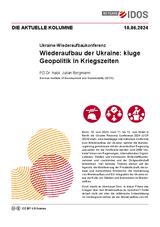The Current Column
Ukraine Recovery Conference
Supporting Ukraine’s recovery: shrewd geopolitics in times of war
Bergmann, JulianThe Current Column (2024)
Bonn: German Institute of Development and Sustainability (IDOS), The Current Column of 10 June 2024
Bonn, 10 June 2024. On 11–12 June, the Ukraine Recovery Conference 2024 (UCR 2024), a two-day international conference jointly hosted by the German and Ukrainian governments, will be held in Berlin. The conference will be attended by around 2,000 representatives of governments, international organisations, towns, cities and municipalities, companies, business associations and civil society. It will focus on four key topics: mobilising the private sector for reconstruction and recovery efforts; the social and human dimension of recovery; dovetailing recovery and Ukraine’s EU integration; and the role of towns, cities and municipalities in recovery.
Yet does it really make sense to talk about recovery during this phase of the war? Should we not currently be focusing instead on military support rather than on reconstructing infrastructure, which might well be destroyed again in the next Russian missile attack? Surely we first need a peace agreement or at least a ceasefire before we can get started on recovery?
Politicians and experts who have been working on the topic of Ukraine’s recovery over the past two years are all too familiar with these important and justified questions. There are clear answers to these questions, however, particularly if we look at what exactly the term ‘recovery‘ means.
Recovery in Ukraine is not a theoretical, post-conflict scenario for the moment the war is over. Recovery efforts have already been under way for two years now – through direct budget support to the Ukrainian state but also in the form of reconstructing and repairing schools, hospitals, residential buildings and infrastructure in the transport and energy sector. This type of support is key to maintaining public services and to meeting the basic needs of the Ukrainian population. In addition to the concrete benefits for the population, this kind of support also sends out the important political message that we will not allow Russia’s aggression to reduce the country to rubble.
The criticism voiced in a recent article in the German newspaper Frankfurter Allgemeine Zeitung that development aid ‘does not help against Putin’ seems to ignore the crucial significance of civil support for Ukraine in times of war. This important dimension of support for Ukraine is exactly what the conference in Berlin will be focusing on in the next few days. Development cooperation is the key instrument for recovery and hence also plays an important geopolitical role while making a major contribution to promoting Ukrainian society’s capacity for resistance and its resilience in times of war. This is just as important as boosting Ukraine’s military capabilities to withstand Russian aggression.
Instead of considering civil and military support for Ukraine separately, we need to adopt an integrated understanding of security – as set out in the German government’s National Security Strategy published a year ago. In this line of thinking, it makes sense to create space at the conference for talks on stepping up military aid to Ukraine too, particularly with regard to strengthening the country’s air defence system.
As a long-term transformation project, recovery will ultimately only be fully successful if there is peace in Ukraine. However, this peace must be fair; it must not be peace through occupation but instead must mean peace in freedom for the people of Ukraine. It is no coincidence that a Global Peace Summit for Ukraine is being held in Switzerland only three days after the Ukraine Recovery Conference in Berlin. If the more than 80 government delegations attending the summit manage to arrive at a common understanding of a just peace in Ukraine, this would also be an important signal of international support for the country’s recovery.
To assess the outcomes of the Ukraine Recovery Conference, observers should focus on two aspects. Firstly, the conference can be regarded as a success if it manages to achieve a broad alliance for Ukraine’s recovery not only among the G7 nations and the EU Member States but among other participants too, including countries in the Global South, international businesses and global civil society.
Secondly, it will be important to institutionalise the conference’s inclusive approach beyond the URC 2024 for the actual implementation of recovery efforts in Ukraine itself. Close involvement of civil society in the conference programme and attendance for the first time by representatives of Ukrainian municipalities are a good sign. At the same time, concrete implementation of recovery measures must be organised by the Ukrainian government in such a way that civil society, municipal and private sector actors have the right to participate and be heard so that they can play an active role in shaping both Ukraine’s recovery and EU integration.
The Ukraine Recovery Conference is a clear signal of comprehensive support for Ukraine in the face of Putin’s policy of imperialist expansion – now and in the future.


